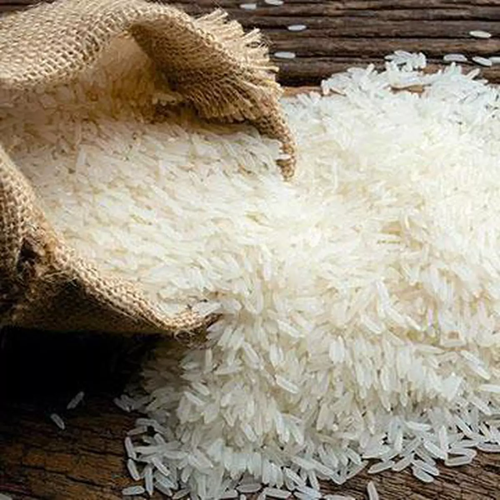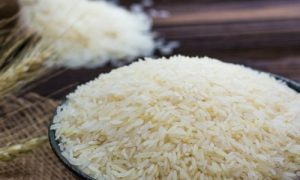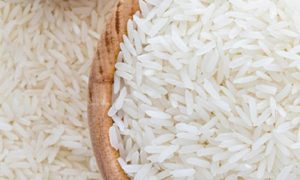Rice price sees sudden jump in Ramadan

Traders say despite ample stock available at the retail market, the retail price of rice has also increased by Tk2 to Tk4 per kg.
Stakeholders say rice prices did not increase during Ramadan in the past 15 years. During Ramadan, there is typically a rise in demand for pulses while demand for rice decreases, maintaining stability in the rice market.
The price of rice saw an increase once in January this year, but it was subsequently reduced slightly with government intervention. But now it has gone up again, they say.
According to rice mill owners and wholesalers, last week, coarse rice varieties like Swarna and Chinese IRRI were priced at Tk42-Tk43 per kg at the wholesale level, but are now selling for Tk46-Tk47. Medium-quality rice types such as Paijam, BR-28, BR-29, and BR-49 have increased from Tk48-Tk50 per kg to Tk53-Tk55.
Coarse parboiled rice from Chattogram is currently priced at Tk46 per kg at the wholesale level, up from Tk42-Tk43. Additionally, the cost of fine rice varieties like Miniket and Nazirshail has risen from Tk65-Tk67 to Tk70-Tk72 per kg.
Meanwhile, traders say retailers are purchasing less rice due to the relatively low demand during Ramadan. Consequently, the impact of the wholesale price rise at the retail level is comparatively minor.
According to traders, retail stores are adequately stocked with rice, leading retailers to refrain from making additional purchases upon hearing news of the wholesale price increase.
Currently, coarse rice varieties such as Swarna and Chinese IRRI, priced at Tk50-Tk51 per kg a week ago in Riazuddin Bazar of Chattogram, have now risen to Tk52-Tk53 at the retail level. Medium-quality rice types like Paijam, BR-28, BR-29, and BR-49 are being sold at Tk55-Tk57 per kg, up from Tk54-Tk55.
Additionally, the price of fine rice such as Miniket and Nazirshail has increased from Tk62-Tk78 per kg to Tk64-Tk80 in the retail market.
Syed Haque, proprietor of Al Farooq and Sons in Riazuddin Bazaar, told TBS, “I reached out to wholesalers and traders to purchase some rice. The price of rice has surged by Tk2-Tk6 per kg and Tk50-Tk150 per sack. That’s why I haven’t procured any additional rice this time.”
Mill owners and wholesalers report that the supply of paddy is low and prices are high, leading a segment of traders to raise the price of rice despite abundant stocks.
Furthermore, increased demand during Ramadan has resulted in a rise in the supply of potatoes and onions from the Northern districts. Consequently, transportation costs for rice have also slightly increased due to heightened transportation demands. These factors collectively impact the rice market, according to them.
Farid Uddin Ahmed, proprietor of B Baria Auto Rice Mill, told TBS, “We mainly bring paddy from Dinajpur, Mymensingh. The price of paddy has increased by Tk50-Tk150 per maund. This has affected the rice market.”
“The supply of paddy is relatively low. Good quality paddy is being sold at Tk1,450 per maund, up from Tk1,350 per maund. Coarse paddy is being sold at Tk1,300-Tk1,350 per maund, up from Tk1,200,” he said.
“New paddy will come in a month. Before that such a crisis is unexpected even for us,” he further said.
Regarding the increased transport costs, Farid Uddin said, “Previously, the fare for a truck from Mymensingh to Chattogram ranged from Tk16,000 to Tk17,000. Now it has surged to Tk23,000 to Tk24,000. This means the transportation expenses have escalated by up to Tk5,000 to Tk10,000 per truck, further impacting the rice market.”
Abdul Goni Peyar, owner of Jeddah Auto Rice Mill in Khatunganj, Chattogram, said, “We procure rice from Dinajpur, Kushtia, and Habiganj. Suppliers in those areas indicate a scarcity of paddy, leading to a shortage of rice. Consequently, rice needs to be acquired at higher prices. The suppliers also report that there are many warehouses without any rice in stock.”
Source Link : https://www.tbsnews.net/economy/bazaar/rice-price-sees-sudden-jump-ramadan-813516
















